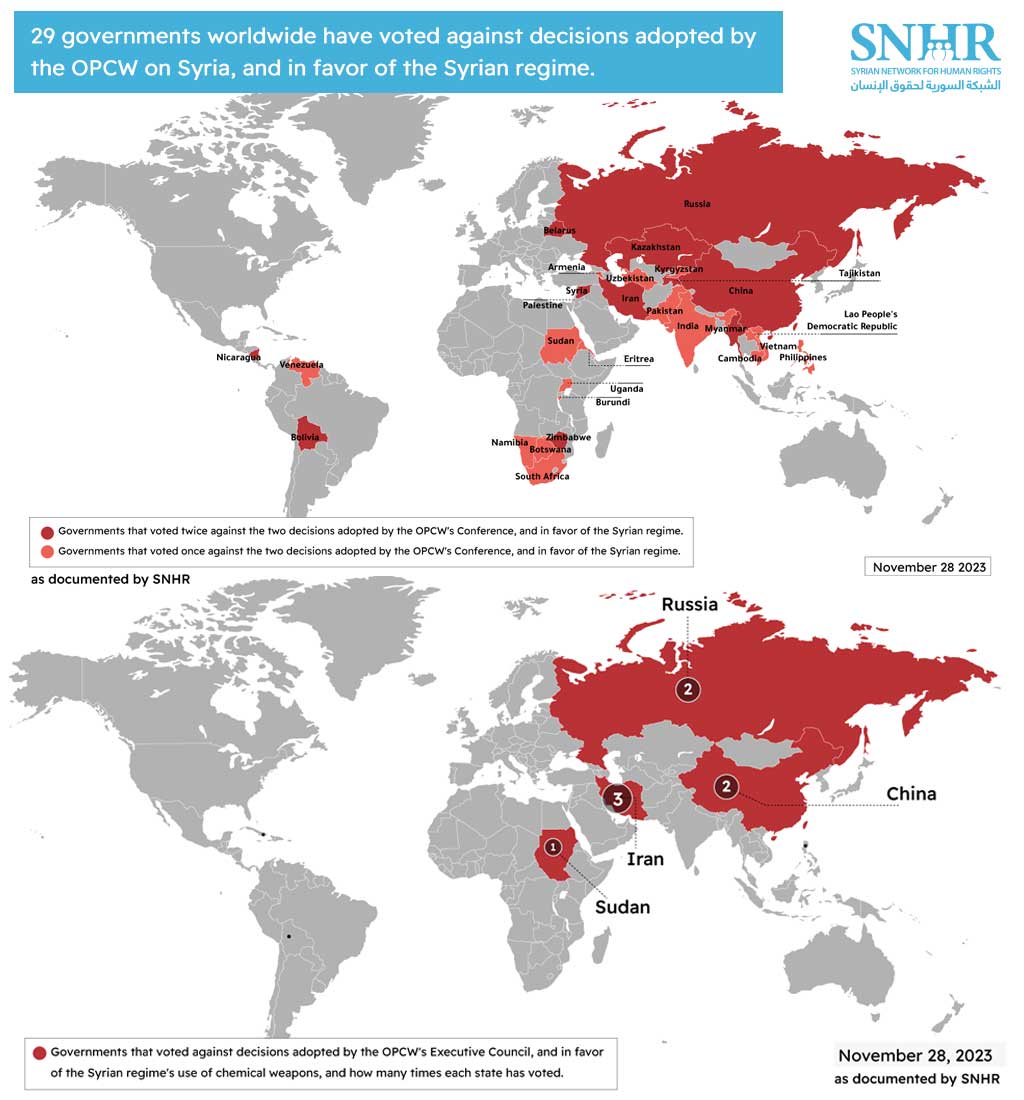Many States Worldwide Must Bring Cases Against the Syrian Regime Before the ICJ Over the Regime’s Repeated Violations of the CWC

Languages
Available In
Press release: (Download the full report below)
The Hague – The Syrian Network for Human Rights (SNHR) today issued a report entitled ‘29 Morally Bankrupt Governments, Headed by Russia, Voted Against the OPCW’s Resolutions’, emphasizing that many states worldwide must bring cases against the Syrian regime before the International Criminal Court (ICC) over the regime’s repeated violations of the Chemical Weapons Convention (CWC).
In the 15-page report, SNHR notes that the Syrian regime has carried out 184 chemical attacks since ratifying the Convention in September 2013. The report outlines the decisions adopted by the Organization for the Prohibition of Chemical Weapons (OPCW), identifying the states that voted against those decisions, or in other words the states that support the continuation of the Syrian regime’s chemical weapons program. Through this action, it notes, these states are, in effect, encouraging the regime to use weapons of mass destruction – chemical weapons – and emboldening it to carry out more chemical weapons attacks against the Syrian people.
As Fadel Abdul Ghany, SNHR’s Executive Director, says:
“The Syrian regime has unequivocally contravened the CWC on 184 separate occasions, as proven by many domestic, international, and UN bodies, including the COI, the UN-OPCW JIM, the OPCW’s IIT, HRW, Amnesty International, and SNHR. This massive body of evidence warrants a renewal of our calls to bring a case against the Syrian regime before the ICC for contravening the CWC.”
The report reveals that the OPCW adopted 10 decisions, through which it aimed to eliminate the Syrian regime’s chemical weapons program, destroy the facilities used by the regime to produce, manufacture, and store chemical weapons, preserve the rights of the victims, and hold those responsible for chemical weapons attacks in Syria accountable. These decisions are divided between eight decisions adopted by the OPCW’s Executive Council and two adopted by the OPCW’s Conference of the State Parties, with the report providing an outline of those 10 decisions.
Moreover, the report identifies the governments that voted against the decisions adopted by the OPCW, stressing that a number of what the report describes as ‘morally bankrupt’ governments which voted once or more in favor of the Syrian regime’s use of chemical weapons in Syria, have thus emboldened the regime to use these weapons repeatedly, even after its ratification of the CWC. The report also notes that that these votes are a message of disapproval against the expansion of the OPCW’s mandate, against the reports released by the OPCW, which were based on rigorous methodology, and most importantly against the victims who were killed or injured by the Syrian regime’s unconscionable and repeated use of internationally outlawed chemical weapons, that is, weapons of mass destruction, against the Syrian people.
These states, the report further adds, share a number of common characteristics, such as dictatorial and oppressive leadership, opposition to fundamental human rights, and, in some cases, absolute loyalty to Russia and Iran, i.e., the Syrian regime’s two main allies. Still, however, those states constitute a minority which has been consistently defeated many times in votes. There are 29 states that voted against one or more OPCW decisions, including four who voted in support of the regime on decisions proposed both by the Executive Council and the Conference.
The report stresses that the most recent decision adopted by the OPCW, stripping Syria of its privileges as a state party in the CWC, will not be enough to deter the regime and its allies, noting that action must be taken by the UN General Assembly. In case the UN General Assembly is unable or unwilling to act, the report emphasizes, the democratic, liberal states of the world must demonstrate their adherence to international law in every way, shape, and form, and as such establish an alliance to achieve this.
The report calls on the OPCW to promote and support the OPCW’s team on Syria, which is facing ruthless opposition from Russia and many dictatorships around the world. This is particularly vital since the OPCW’s work on the issue of chemical weapons in Syria is arguably the most important task that the OPCW has yet had to address since its establishment. There is still much work to be done concerning Syria compared to the almost non-existent use of chemical weapons elsewhere in the world. The report also calls on the OPCW to modify the voting mechanism in order to allow the presence of civil society organizations, especially those actively working on the issue of chemical weapons.
The report also calls on the OPCW’s state parties to take action at all levels to deter the Syrian regime and end all forms of cooperation with it, as well as take action in light of the Syrian regime’s contravention of the convention before the International Court of Justice (ICJ), similar to the case brought by Canada and The Netherlands over the application of the UN Convention Against Torture, in addition to making other recommendations.


